listening skill tips 英语听力技巧
做英语听力的技巧和方法
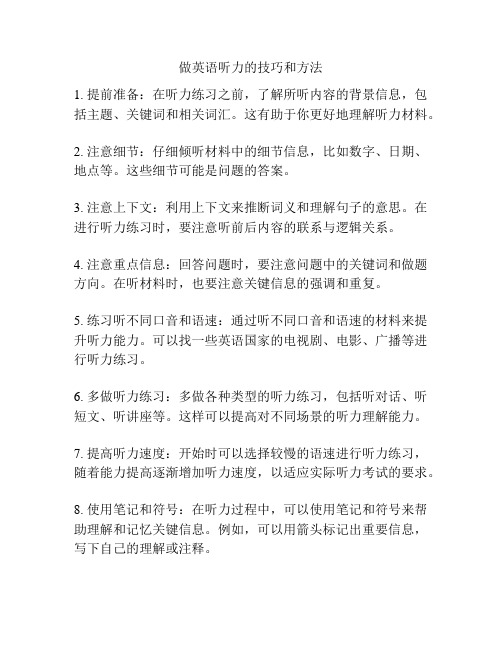
做英语听力的技巧和方法
1. 提前准备:在听力练习之前,了解所听内容的背景信息,包括主题、关键词和相关词汇。
这有助于你更好地理解听力材料。
2. 注意细节:仔细倾听材料中的细节信息,比如数字、日期、地点等。
这些细节可能是问题的答案。
3. 注意上下文:利用上下文来推断词义和理解句子的意思。
在进行听力练习时,要注意听前后内容的联系与逻辑关系。
4. 注意重点信息:回答问题时,要注意问题中的关键词和做题方向。
在听材料时,也要注意关键信息的强调和重复。
5. 练习听不同口音和语速:通过听不同口音和语速的材料来提升听力能力。
可以找一些英语国家的电视剧、电影、广播等进行听力练习。
6. 多做听力练习:多做各种类型的听力练习,包括听对话、听短文、听讲座等。
这样可以提高对不同场景的听力理解能力。
7. 提高听力速度:开始时可以选择较慢的语速进行听力练习,随着能力提高逐渐增加听力速度,以适应实际听力考试的要求。
8. 使用笔记和符号:在听力过程中,可以使用笔记和符号来帮助理解和记忆关键信息。
例如,可以用箭头标记出重要信息,写下自己的理解或注释。
9. 反思分析:练习完成后,回顾听力材料,分析自己在听的过程中出现的问题,并思考改进的方法。
定期进行反思和总结,有助于提高听力技巧。
10. 练习多样化:除了完成一些标准的听力练习,还可以尝试其他形式的听力训练,如听语音材料、听音乐歌词、听英文电台等。
这样可以增加听力的兴趣和乐趣,加强对不同语言形式的理解。
英语听力注意事项及技巧
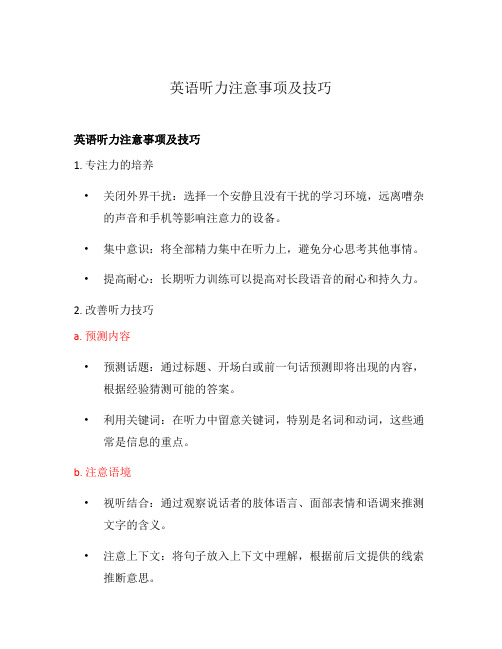
英语听力注意事项及技巧英语听力注意事项及技巧1. 专注力的培养•关闭外界干扰:选择一个安静且没有干扰的学习环境,远离嘈杂的声音和手机等影响注意力的设备。
•集中意识:将全部精力集中在听力上,避免分心思考其他事情。
•提高耐心:长期听力训练可以提高对长段语音的耐心和持久力。
2. 改善听力技巧a. 预测内容•预测话题:通过标题、开场白或前一句话预测即将出现的内容,根据经验猜测可能的答案。
•利用关键词:在听力中留意关键词,特别是名词和动词,这些通常是信息的重点。
b. 注意语境•视听结合:通过观察说话者的肢体语言、面部表情和语调来推测文字的含义。
•注意上下文:将句子放入上下文中理解,根据前后文提供的线索推断意思。
c. 针对细节•注意特殊词汇:关注特殊词汇的发音、拼写和意义,可以加强对话题的理解。
•区分近义词:细心辨别近义词的差异,了解不同词语在不同语境中的用法。
d. 收听不同口音•增加听力素材:尝试听取不同地区的英语口音,扩大对不同发音和语速的适应能力。
3. 提高听力技能的方法a. 多听多练•听力材料选择:选择适合自己英语水平和兴趣的听力材料,如TED Talks、BBC节目等。
•多样化题材:涉及不同领域和话题的听力练习,有助于熟悉各种词汇和表达方式。
b. 听力笔记的技巧•笔记要点:将重要内容或关键词写在笔记中,以便后续复习和巩固记忆。
•笔记简洁明了:用简洁的短语或关键词进行记录,避免过于冗长而导致错过内容。
c. 利用辅助工具•听力软件:使用配有字幕功能的软件进行听力练习,同时借助字幕辅助理解。
•慢速播放:将听力材料在较慢的速度下播放,逐渐增加速度以提高听力反应能力。
通过以上注意事项和技巧,你可以有效地提高英语听力水平,并更好地理解和运用所听取的内容。
不断的练习和积累经验,你将逐渐成为一个优秀的英语听力者。
10个听力技巧有助于提高英语听说能力
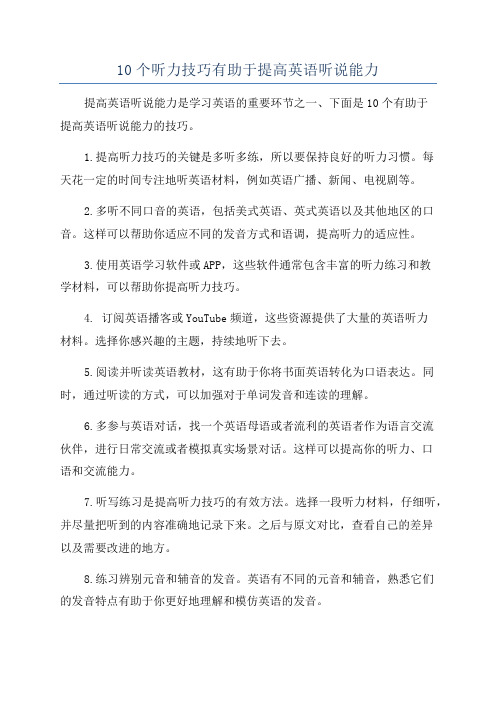
10个听力技巧有助于提高英语听说能力提高英语听说能力是学习英语的重要环节之一、下面是10个有助于提高英语听说能力的技巧。
1.提高听力技巧的关键是多听多练,所以要保持良好的听力习惯。
每天花一定的时间专注地听英语材料,例如英语广播、新闻、电视剧等。
2.多听不同口音的英语,包括美式英语、英式英语以及其他地区的口音。
这样可以帮助你适应不同的发音方式和语调,提高听力的适应性。
3.使用英语学习软件或APP,这些软件通常包含丰富的听力练习和教学材料,可以帮助你提高听力技巧。
4. 订阅英语播客或YouTube频道,这些资源提供了大量的英语听力材料。
选择你感兴趣的主题,持续地听下去。
5.阅读并听读英语教材,这有助于你将书面英语转化为口语表达。
同时,通过听读的方式,可以加强对于单词发音和连读的理解。
6.多参与英语对话,找一个英语母语或者流利的英语者作为语言交流伙伴,进行日常交流或者模拟真实场景对话。
这样可以提高你的听力、口语和交流能力。
7.听写练习是提高听力技巧的有效方法。
选择一段听力材料,仔细听,并尽量把听到的内容准确地记录下来。
之后与原文对比,查看自己的差异以及需要改进的地方。
8.练习辨别元音和辅音的发音。
英语有不同的元音和辅音,熟悉它们的发音特点有助于你更好地理解和模仿英语的发音。
9.模仿英语母语者的语调和语音强度。
注意他们的语速、重音以及语调起伏。
在模仿过程中,加强对英语句子结构和音调的理解。
10.练习听不同的语速和难度的材料。
从简单的材料开始,逐渐过渡到难度较高的材料。
这样可以提高你的听力反应速度和理解能力。
通过不断的练习和专注,你的英语听说能力会得到提高。
记住,多听多说是关键,坚持练习才能收获进步。
英语听力方法技巧整理

英语听力方法技巧整理以下是一些英语听力的方法和技巧,希望能够帮助你提高听力水平:1. 提前预习:在听力练习之前,先了解话题背景和相关词汇,有助于理解和跟上听力材料。
2. 注重整体理解:努力理解整个句子或段落的意思,而不是仅仅关注单词的意义。
通过把握上下文,可以更好地理解整个故事。
3. 练习听不同的英语口音:通过听不同地区的英语口音,可以提高对不同口音和语速的适应能力。
4. 练习听不同类型的材料:包括新闻报道、讲座、广播剧等。
这样可以增加对不同语境下的听力理解能力。
5. 听多样的语速:找到不同语速的听力材料,以便训练自己在不同情况下听懂英语。
6. 利用图像帮助理解:观看与听力材料相关的图像、图片或视频,可以帮助加深对内容的理解。
7. 练习听较长的材料:逐渐增加听力材料的长度,提高持续的听力和集中注意力的能力。
8. 反复听:重复听同一段材料,直到能够完全理解并准确听出每个音节和单词。
9. 多听自然语速的材料:努力从既定的英语资源中获取更多的听力材料,例如英语电影、纪录片、音乐等。
10. 跟读:尝试跟读英语材料,模仿说话者的语调和语速,提高自己的语音和发音。
11. 听音乐歌词:通过听音乐并阅读歌词,可以提高对英语的听力和理解能力。
12. 学习常见的连读和缩略词:了解并掌握英语中常见的连读和缩略词,以提高对快速口语的理解能力。
13. 制定学习计划:设定每天的听力练习时间,并坚持下去。
随着练习的不断积累,你的听力水平会逐渐提高。
14. 多样化的练习:除了单纯的听力练习外,还可以结合其他技能,如阅读、写作和口语练习,以全面提高语言能力。
希望这些方法和技巧对你有所帮助,祝你取得好成绩!。
英语听力训练的技巧和建议

英语听力训练的技巧和建议英语听力是学习英语的重要组成部分,对于提高英语水平起着至关重要的作用。
然而,很多学习者在听力方面遇到了困难。
本文将为大家提供一些英语听力训练的技巧和建议,帮助大家突破听力难关。
第一,多听英语材料。
要提高听力能力,必须多听英语,尽可能多地接触英语环境。
可以通过听英语歌曲、看英语电影和电视剧、听英语广播和新闻等方式来增加接触英语的机会。
此外,还可以选择一些专门的英语听力材料,如英语听力教材、网上英语听力资源等。
多听英语能够让我们熟悉英语的发音、语调和常用表达方式,从而提高听力理解能力。
第二,注意听力环境。
在进行英语听力训练时,选择一个相对安静、没有干扰的环境会更有利于我们的听力学习。
可以选择在图书馆、自习室或者私人空间进行听力练习,避免嘈杂的环境对我们的学习造成干扰。
第三,练习听力题型。
在进行英语听力训练时,我们需要熟悉各种常见的听力题型,如听对话回答问题、听长对话回答问题、听短文回答问题等等。
我们可以通过做一些针对性的听力练习来提高自己对不同题型的应对能力。
可以选择一些专门的听力练习册或者网上的听力练习资源进行练习。
第四,提高词汇量。
词汇是听力理解的基础,只有掌握了足够的词汇量,才能更好地理解听力材料。
因此,我们需要不断地扩充自己的词汇量,通过背单词、阅读和听力练习等方式来提高自己的词汇水平。
第五,学会捕捉关键词。
在进行听力训练时,我们可以通过捕捉关键词来快速理解听力材料的意思。
可以通过重点标记或者记笔记的方式来帮助我们记住关键信息。
逐渐习惯这种方法后,我们在面对听力材料时能够更快地获取有效信息。
第六,多进行听力复述。
听力复述是一个非常有效的听力训练方式。
我们可以找一些短文或者听力材料进行听力练习,然后试着将听到的内容用自己的语言进行复述。
这样可以提高我们的听力理解能力,同时也可以加强我们的口语表达能力。
综上所述,通过多听英语材料、注意听力环境、练习听力题型、提高词汇量、学会捕捉关键词和进行听力复述等方法,我们可以有效地提高自己的英语听力水平。
英语听力技巧总结精选英语听力方法

英语听力技巧总结精选英语听力方法老师发音不纯正,播报英语听力技巧语速过慢,缺少原汁原味的英语听力输入等都造成了中国人听力水平的薄弱。
那么如何有效地在这种环境中突围,成为一个英语听力达人呢?以下是精心收集整理的英语听力技巧总结,下面就和大家分享,来欣赏一下吧。
英语听力技巧总结1【方法一:泛听以增加听感】泛听不仅指题材广泛,也指平时不集中注意力状态下的听力。
这样做的目的是“磨耳朵”,增加你的听感。
你可以把听力放着,一边听一边做着其他的事。
做这种泛听有一个技巧,就是可以先听几遍,然后了解文本的大概含义,然后再接着听几遍,这样可以有效地增加泛听的效果。
另外,听力材料的主题必须多样,不光是新闻类听力如voa,bbc等,也必须包括经济类如theEconomicst,生活类如疯狂英语等。
总之我们必须使自己熟悉各种各样的题材,并且选择不同难度梯度的材料来进行训练。
比较推荐的几个英语听力网站包括可可英语,大耳朵英语和普特英语。
里面的材料都非常丰富.比如文学名著听力,经典散文诗歌和实用英语听力等.学生可以不用到处搜集各种题材的文本,只需浏览这些网站即可.【方法二:精听以剖析结构】泛听是基础,精听是房屋,只有打好了基础,才可以高屋建瓴。
精听的目的是了解英语*的大概结构和美国人的思维。
这对于我们掌握英语听力非常有效。
首先我们要选择一个高质量的文本,如一篇voa听力等,然后我们可以完整地听几遍,以了解它的大概意思,接着要一句一句地精听,找出句子与句子之间的联系,如因果,转承等。
例如,一般来说英语新闻播报会讲述大概内容,然后是报道事件的细节.而对于经济类听力来说,topic通常出现在每段的开头部分。
经过多次这样的分析之后,你就可以对英语的大致结构有一个大致的了解,拿到任何一篇听力,我们都能做到临危不乱。
另外,推荐一个非常好的精听工具,就是歪歪(YY)。
上面有普特和大耳朵的频道,你可以和很多人一起做听力,可以有效地督促自己。
英语听力的技巧

英语听力的技巧
1. 嘿,听英语的时候可别像个木头人呀!要积极主动起来!比如说听英语广播的时候,别光傻听呀,要跟着心里默念,这样才能真正把听到的东西印在脑子里呀!就像学骑自行车,光看着可不行,得亲自去骑呀!
2. 哇塞,听英语得集中精力呀!别一边听一边还想着别的事儿。
你想想,要是你和朋友聊天的时候心不在焉,能听懂朋友说啥吗?听英语也是一样的道理呀!
3. 哎呀,听的时候要抓住关键词呀!比如听到“but”“however”这些词,后面往往就是重点啦!就像在一堆沙子里找金子,得知道金子长啥样呀!
4. 嘿呀,重复听很重要哦!一遍听不懂,那就再来一遍呀!就像打游戏,一次没过,那就再来一次,总会过关的嘛!
5. 哇哦,听英语的时候要大胆猜测呀!有些词没听清,但是根据上下文也能猜个大概呀!好比拼图,有些地方看不清,但整体能猜出个样子呀!
6. 哎哟喂,别光听呀,听完了要总结呀!不然听完就忘啦!就像去旅行,回来总得回味一下呀!
7. 嘿,听不同类型的材料呀!别老是听一种,会腻的呀!就像吃东西,总吃一样会烦的,得换着来呀!
8. 呀,要模仿人家的发音呀!这样不仅能提高听力,还能让你的口语变好呢!就像学唱歌,模仿原唱才能唱得好呀!
9. 哇,平时多积累词汇呀!不然听到了也不认识呀!就像盖房子,没有砖头怎么盖呀!
10. 嘿,保持耐心和热情呀!听力提高可没那么快,但坚持下去肯定有效果呀!就像爬山,过程累,但到了山顶就觉得一切都值啦!
我觉得呀,这些英语听力技巧真的很有用,只要大家认真去做,英语听力肯定能越来越好!。
学习英语听力技巧

学习英语听力技巧随着英语在全球范围内的广泛应用,学习英语的重要性越来越被人们所重视。
而英语听力作为英语学习的重要组成部分,对于提高英语水平至关重要。
本文将为大家分享一些学习英语听力的技巧,希望能给大家带来帮助。
技巧一:多听多读学习英语听力最基础的方法就是多听多读。
可以通过听英语电影、英语歌曲、英语新闻等来提高自己的英语听力能力。
其中,英语歌曲是一个非常好的学习资源,因为歌曲的节奏和韵律对于听力的练习非常有帮助。
另外,英语小说、英语阅读材料也是一个很好的选择。
通过阅读来扩大自己的英语词汇量,同时也可以提高自己的英语听力能力。
技巧二:关注语音语调学习英语听力不仅要注意语言的内容,也要关注语言的语音语调。
因为语音语调是决定英语发音好坏的关键。
只有练习了标准的语音语调,才能更好地听懂英语的内容。
此外,语音语调在表达情感时也有非常重要的作用。
比如高兴、悲伤、惊讶等不同情感的表达,注意听说者的语调变化就可以更好地理解其表述的内容。
技巧三:注重语言的上下文在学习英语听力的过程中,需要注重语言的上下文。
当听到语言的一部分时,需要结合前后文来理解其含义。
因为有些单词的用法和意义在上下文中会发生变化,所以只有清晰地把握上下文的情况,才能更好地理解整个句子或段落的含义。
技巧四:注意词汇的细节在学习英语听力的过程中,需要注重词汇的细节。
要注意单词的发音、拼写和含义等细节。
有时候,一些细节上的差异可能会导致听错或者听不懂。
因此,只有注重词汇的细节,才能更好地提高自己的英语听力能力。
技巧五:利用辅助工具学习英语听力还可以利用一些辅助工具来提高学习效果。
比如,听力训练软件、听力材料等。
这些工具可以帮助学习者更有针对性地进行听力练习,提高自己的听力水平。
总之,学习英语听力不是一件简单的事情,需要学习者通过不断地练习和努力来逐渐提高自己的水平。
同时,需要注重语音语调、语言上下文、词汇细节等方面,才能更好地理解英语的内容,从而提高自己的英语听力能力。
listeningskills听力技巧和常用方法

Practice(练习).发音有问题是难免的,因此很多人会 害怕说错而不开口。没关系,多练习就好了,不要害羞。
Find a partner(找伙伴).从别人那里得到反馈是很重 要的。找个也对提高英语水平感兴趣的伙伴,互相鼓励, 互相比赛,多对话。
Be poetic(充满诗意).大声地念诗、演讲,专注在字的 重音和音调。因为,诗歌通常都是琅琅上口,有节奏感 的,多多练习有助于提高英语水平。发音准了,语调对 了,语感慢慢出来了,这对记忆单词和交流都有好处。
泛听
泛听目的有二:一是练习捕捉大意,让理解单位从 “词汇”到“句子”再到“大意”;二是熟悉语速和 语境,既真实英语的使用环境。切忌把泛听当精听。 战胜“细节完美主义”的办法是重大意而非细节,重 内容而非语言,重正在听的内容而非听过的内容。
“拳不离手,曲不离口”,泛听要形成“磨耳朵” 的习惯,充效果。
学习方法与策略
在阅读过程中、从书本例句中、从对话中 看、听到地道、标准、典型、或优美的句 子摘抄下来。
将每一个摘抄的句子分别记在不同卡片或 纸条上随身携带。
随时取出尽量做到大声、快速、清晰地读 几遍。
.经常回忆所记的句子。
suggestions
Listen to yourself(听自己).如果你不能听出你自 己的发音问题,就很难去改正它。试着把你的朗读或 演说录下来,并与以英语为母语的外国人士做个比较。
Listen for key words. Key words are stressed. They are louder, longer, and higher pitched than other words. These are the words that the speaker thinks are most important in a sentence. For example, notice the stress and intonation in this dialogue: A: I went to the store. B: Which store?
英语听力学习技巧

英语听力学习技巧英语听力学习技巧英语是一种西日耳曼语支,最早被中世纪的英国使用,并因其广阔的殖民地而成为世界使用面积最广的语言。
以下是小编帮大家整理的,欢迎大家借鉴与参考,希望对大家有所帮助。
下面是小编为大家收集的英语听力学习技巧,欢迎大家分享。
英语听力学习技巧篇1技巧一是:持之以恒地学习。
学习英语最怕有懈怠之心,在学习中要排除任何干扰,雷打不动。
如果不能长时间的坚持,听力练习必然就没有效果。
技巧二是:加强力度地学。
英语听力的学习就需要加强练习的强度。
技巧三是:听写结合地学。
听是一方面,写出来才是硬功夫。
技巧四是:听说结合地学。
英语学习光听还不够,一定敢勇于张嘴说出来。
技巧五是:影子跟读学。
跟着读,才能体悟其中的语法知识。
技巧六是:理解单词地学。
英语是词语的组合,形成句子。
一段听力中,哪怕个别单词没听懂,也可以把握个别关键单词。
技巧七是:心里默念地学。
心里默念是一种非常好的学习方法,学生们都普遍用这种方法。
技巧八是:原原本本学原著地学。
英语原著才是精华,才是练习听力的极好的东西。
技巧九是:带着问题地学。
英语听力一定要带着疑问、带着问题学习。
技巧十是:掌握语法地学。
语法是英语的关键,也是听力的关键。
技巧十一是:思维想象地学。
英语听力不光要听,也要去想象,想象在那种语法情景中应该如何说。
技巧十二是:推断弦外之音地学。
英语听力也需要推断理解,就像汉语一样,肯定是有固定搭配的,肯定会有弦外之音的。
总而言之,学习好英语听力就需要要清楚地意识到提高英语听力非一日之功,必须持之以恒,多多练习。
英语听力学习技巧篇2技巧一:学会取舍,理解内容听力考试中最忌讳的就是词词计较,力求听懂所有词。
其实,听懂所有词首先没必要,其次也不可能。
我们在日常生活中听中文时,无论听什么,注意力都不会在每一个字或词上面,而是对文段或对话内容的整体的理解上。
何况我们听的是英文,在英文句子中,对不同的词本身就有弱读和重读。
技巧二:扫视材料,预测内容当广播中朗读听力要求时,我们要充分利用这个时间,迅速扫视书面文字中的题干及选项,通过扫视联系上下文,有根据地预测文段发生的时间、场所、人物,并预测出谈话的大致内容。
英语听的技巧

英语听的技巧(一) 听前(pre-listening)听力考试前必须稳定情绪,做好听音的准备工作。
在放音之前,抓紧时间速读书面选择项,对可能制定的内容作出粗略的推测和推断,同时也必须进行联想,即可能会出现的内容与自己具有的相关知识联系起来,思想介入到要听的内容中去。
如假设选择项中出现不同的人名、地名、数字、时间或年代以及不同的动词时,必须做好强记的准备。
(二) 听时(while-listening)听音时思想要集中,但情绪不可过度紧张。
在听音中要利用猜测时得到的潜在信息把握听音的重点,也可利用符号、图示等方法迅速记录要点以促进有效记忆。
在听音过程中,必须眼耳并用,也就是一边用耳听,一边用眼浏览选择项进行分析和归纳,做到听与浏览相结合、听与思索及记忆相结合。
这一过程必须在短暂的时间内完成。
(三) 听后(post-listening)听完录音后要迅速意念和整理所听懂的内容,并依据书面问题选择或检验答案。
要严格控制答题时间,正确答案与听力原文之间的统一性是解题的基本方法。
考生要善于依据提问的形式,采纳不同的解题方法。
2提升英语听力的基本方法1..跟读的方法:跟读的方法是语言学习过程中最有效的方法之一。
有两种学习方法,一句一句的跟读,直到整篇文章读完;另一种是跟着原声将整段或者整篇文章跟读下来。
后一种方式,对整体文章的把握具有很好的效果。
建议采纳。
跟读的方法在前期过程中要反复使用。
有些发音优美的文章值得反复跟读多遍,直到能够背诵为佳。
2..大声朗诵的方法:大声朗诵是跟读方法的延续。
最好是在你认为跟读得比较像得状况下,进行大声的朗诵。
朗诵当然就要出声,出声就会对耳朵和大脑有刺激,有刺激就会引起生理的变化,朗诵到一按时候,你会发现你的舌头不再僵硬了。
这对日后的口语表达奠定了优良的发声基础。
大声朗诵有几个要素可以辅助使用,以提升朗诵的效率。
一是激情朗诵法。
这个意思当然非常显然,语音语调、抑扬顿挫、全情投入,发挥全身的参加,不仅朗诵感觉很好,而且效果非常显然;二是捂住耳朵朗诵。
提高英语听力的方法技巧总结大全

提高英语听力的方法技巧总结大全英语听力是学习英语过程中非常重要的一项技能,也是很多学习者感到困难的一部分。
下面是一些有效的方法和技巧,可以帮助你提高英语听力水平。
1.聆听大量的英语材料为了提高听力技能,最重要的是多听英语。
可以从简单的材料开始,逐渐增加难度。
可以听新闻、录音、有声读物、英语电视节目和电影等。
2.使用有文字的材料在初学阶段,可以使用有文字的材料配合听力练习。
可以选择有文字的歌曲、英语广播或者学习材料,同时边听边阅读,这样可以帮助你更好地理解听到的内容。
3.注重细节在聆听过程中,要注重细节。
试着捕捉关键词、重要信息和语法结构,这有助于你更好地理解整个句子和段落的意思。
4.学习常用词和短语掌握常用的英语词汇和短语是提高听力的基础。
通过学习常见的词汇和短语,你可以更好地理解句子的含义。
5.练习听力材料的多样性听不同的材料,比如新闻、讲座、音乐等,可以帮助你习惯不同的语速、口音和语气。
这样你就能更好地适应不同的听力情境。
6.跟读和模仿通过跟读和模仿母语者的发音、语调和语速,可以提高你的听力水平。
可以选择录音或者视频,边听边模仿。
7.利用互动学习资源利用各种互动学习资源,比如英语播客、在线听力课程、语音对话课程等,可以增加你的听力机会和练习的时间。
8.制定听力计划根据个人的学习目标和时间安排,制定一个听力计划。
可以每天定期听一段英语材料,逐渐增加听力的难度和时间。
9.提高听力速度提高你的听力速度是提高听力技能的重要一环。
可以通过听力练习和速度训练来提高你的听力速度。
10.分析并解决困难在听力练习过程中,你可能会遇到一些困难,比如听不懂一些单词或者句子。
当遇到困难时,要及时分析问题所在,并采取措施解决问题,比如查字典、多次重听等。
11.多练习听力填空和选择题通过练习听力填空和选择题,可以提高你捕捉关键信息、听懂细节的能力。
可以选择一些听力练习书籍或者在线资源进行练习。
12.听自然语速的英语材料尽量听自然语速的英语材料,这样能更好地适应真实情境中的听力。
英语听力学习的技巧和方法
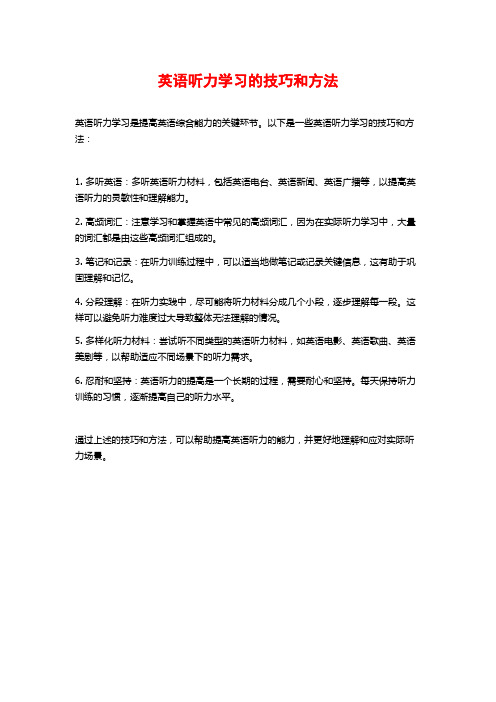
英语听力学习的技巧和方法
英语听力学习是提高英语综合能力的关键环节。
以下是一些英语听力学习的技巧和方法:
1. 多听英语:多听英语听力材料,包括英语电台、英语新闻、英语广播等,以提高英语听力的灵敏性和理解能力。
2. 高频词汇:注意学习和掌握英语中常见的高频词汇,因为在实际听力学习中,大量的词汇都是由这些高频词汇组成的。
3. 笔记和记录:在听力训练过程中,可以适当地做笔记或记录关键信息,这有助于巩固理解和记忆。
4. 分段理解:在听力实践中,尽可能将听力材料分成几个小段,逐步理解每一段。
这样可以避免听力难度过大导致整体无法理解的情况。
5. 多样化听力材料:尝试听不同类型的英语听力材料,如英语电影、英语歌曲、英语美剧等,以帮助适应不同场景下的听力需求。
6. 忍耐和坚持:英语听力的提高是一个长期的过程,需要耐心和坚持。
每天保持听力训练的习惯,逐渐提高自己的听力水平。
通过上述的技巧和方法,可以帮助提高英语听力的能力,并更好地理解和应对实际听力场景。
英语听力技巧总结精编大全

英语听力技巧总结精编大全英语听力是英语学习的重要环节之一,也是很多学习者感到困难的部分。
以下是一些英语听力的技巧总结,希望对你的英语学习有所帮助:1. 提前预习:在听力材料开始前,了解一下主题和背景知识,这样能帮助你更好地理解听力内容。
2. 注意关键词:在听力过程中,注意关键词,这些词往往能够帮助你理解文意。
3. 注意上下文语境:通过上下文语境来猜测不确定的单词或短语的意思。
有时候即使你不认识某个单词,通过上下文也能大致猜出它的意思。
4. 注意重点信息:在听力过程中,尽量抓住关键信息,如数字、日期、人名等,这些信息通常是关键信息,出现时要格外留意。
5. 练习听力材料:多听英语广播、新闻、歌曲等材料,增加你的听力实力。
在听的过程中,可以将重要内容记下来,然后再与原文对照。
6. 注意听力材料的语速:英语听力材料的语速往往较快,对于初学者来说比较困难。
可以尝试调整听力材料的播放速度,慢慢适应快速的语速。
7. 学习辨音:英语中存在很多发音相似的词汇,为了正确听出所听内容,可以多学习不同单词的发音,提高自己的辨音能力。
8. 多练习听力材料:通过多听一些听力材料,可以提高自己的听力水平。
在刚开始时,可以选择一些比较简单的听力材料,随着自己的逐步提高,可以选择一些更难的听力材料。
9. 培养耐心:英语听力过程中,要保持耐心,有时可能听不懂一句话,不要过于着急,可以回放多次,通过上下文推断,记住一些不熟悉的词汇,多练习。
10. 多做笔记:在听力过程中,可以将关键信息记录下来,然后再与原文对照,这样可以帮助你更好地理解和记忆听力内容。
希望以上这些技巧能够对你的英语听力提升有所帮助!。
英语听力技巧与方法精选总结

英语听力技巧与方法精选总结在学习英语的过程中,听力是一项非常重要的技能。
通过听力训练,我们可以提高对英语语音、语调和语速的理解能力,从而更好地理解和运用英语。
以下是一些英语听力技巧和方法的精选总结,希望对大家有所帮助。
1. 提前准备在开始听力训练之前,我们可以先了解一些背景知识,比如主题、人物、地点等,这样有助于我们更好地理解听力材料。
另外,我们还可以预测一些可能出现的词汇和语法结构,以便更好地应对听力挑战。
2. 多样化听力材料为了提高听力技能,我们应该接触不同类型的听力材料,如新闻、讲座、对话、电影等。
这样可以锻炼我们对不同语境下的理解能力,同时也有助于扩大我们的词汇量和语法知识。
3. 提高听力速度英语听力的语速往往比较快,因此我们需要适应这种快速的语音节奏。
一种有效的方法是通过大量的听力练习来提高我们的听力速度。
刚开始时,我们可以选择较慢的听力材料,逐渐增加难度,直到能够迅速理解较快的语音。
4. 注意听力重点在听力过程中,我们应该学会捕捉关键信息,而不是被细节所迷惑。
可以通过注意听力材料中的关键词、数字、时间和地点等信息来帮助我们更好地理解整个内容。
同时,我们还可以通过上下文推断出一些含义,从而更好地把握整体意思。
5. 提高听力记忆力听力记忆力是一个非常重要的技能,它可以帮助我们更好地理解和记住所听到的内容。
为了提高听力记忆力,我们可以尝试以下方法:多听多练,反复听同一段材料,使用笔记记录关键信息,尝试复述所听到的内容等。
6. 利用辅助工具在进行听力训练时,我们可以利用一些辅助工具来帮助我们更好地理解和记忆所听到的内容。
比如,我们可以使用字幕、翻译软件、语音识别软件等。
这些工具可以提供即时的帮助,同时也可以帮助我们更好地理解和应用所学的知识。
7. 练习口语和听力的结合口语和听力是相辅相成的技能,通过练习口语,我们可以更好地提高听力能力。
我们可以通过模仿母语者的发音、参加口语训练班、与他人进行口语交流等方式来提高口语能力。
初中英语-如何提高听力技巧

听力技巧(Enhancing Listening Skills)听力理解是英语学习的重要方面,它不仅是学生掌握语言的能力,还能提高他们在交流中的准确性和流利性。
以下将介绍几种有效的方法来提高学生的听力能力,包括听懂不同口音、辨别信息和记笔记等。
1. 多听多练(Listening Practice)多听多练是提高听力理解能力的基础。
通过大量听英语口语材料,学生可以熟悉不同口音、语调和语速,提高对英语的感知能力。
以下是一些建议:提供丰富的听力材料,例如听力练习题、音频材料和英语原声电影等。
鼓励学生进行听力训练,例如听力测试、听写练习和对话跟读等。
创造真实语境,通过模拟日常对话和情境,增加学生对英语口语的理解和应用能力。
教学建议:配备合适的教学资源,包括录音机、音频材料和英语学习软件等。
设计多样化的听力练习题,包括听对话、听新闻、听讲座等不同类型的听力素材。
2. 辨别口音(Recognizing Accents)辨别不同口音是提高听力理解能力的重要一环。
英语有各种各样的口音,如美式英语、英式英语、澳洲英语等。
以下是一些建议:提供不同口音的听力材料,帮助学生适应和辨别不同发音和语音特点。
引导学生注意重点发音和语调,并提供相应的练习和模仿机会。
鼓励学生多听来自不同地区的英语音频,增加对不同口音的理解和熟悉度。
教学建议:引导学生观察和分析不同口音的发音规律和特点,并提供相应的练习和指导。
提供地道口音的听力材料,引导学生区分不同口音的差异,并提高他们的宽容度和欣赏度。
3. 记笔记(Note-taking)记笔记是提高听力理解能力的重要技巧之一,它可以帮助学生更好地记录关键信息和细节内容。
以下是一些建议:引导学生注意关键词、关键短语和重点句子,并将其记录下来。
鼓励学生使用简洁的符号和缩写来提高记笔记的效率。
练习听力笔记的整理和归纳,培养学生归纳总结的能力。
教学建议:提供听力材料并让学生进行记笔记的练习,加强他们的笔记技巧和听力理解能力。
Listening Skills听力技巧
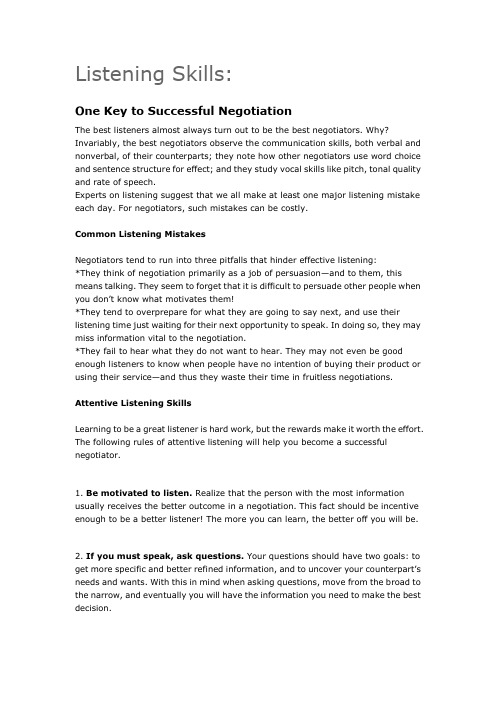
Listening Skills:One Key to Successful NegotiationThe best listeners almost always turn out to be the best negotiators. Why? Invariably, the best negotiators observe the communication skills, both verbal and nonverbal, of their counterparts; they note how other negotiators use word choice and sentence structure for effect; and they study vocal skills like pitch, tonal quality and rate of speech.Experts on listening suggest that we all make at least one major listening mistake each day. For negotiators, such mistakes can be costly.Common Listening MistakesNegotiators tend to run into three pitfalls that hinder effective listening:*They think of negotiation primarily as a job of persuasion—and to them, this means talking. They seem to forget that it is difficult to persuade other people when you don’t kno w what motivates them!*They tend to overprepare for what they are going to say next, and use their listening time just waiting for their next opportunity to speak. In doing so, they may miss information vital to the negotiation.*They fail to hear what they do not want to hear. They may not even be good enough listeners to know when people have no intention of buying their product or using their service—and thus they waste their time in fruitless negotiations.Attentive Listening SkillsLearning to be a great listener is hard work, but the rewards make it worth the effort. The following rules of attentive listening will help you become a successful negotiator.1. Be motivated to listen. Realize that the person with the most information usually receives the better outcome in a negotiation. This fact should be incentive enough to be a better listener! The more you can learn, the better off you will be.2. If you must speak, ask questions. Your questions should have two goals: to get more specific and bet ter refined information, and to uncover your counterpart’s needs and wants. With this in mind when asking questions, move from the broad to the narrow, and eventually you will have the information you need to make the best decision.3. Be alert to nonverbal cues. Although it is critical to listen to what is being said, it is equally important for you to understand the attitudes and motives behind the words. A negotiator doesn’t usually put his entire message into words. His verbal message may convey honesty and conviction while his gestures, facial expressions and tone of voice convey doubt.4. Let the other party tell her story first. A printing salesperson once told me how he had tried to impress a new prospect by mentioning that his company specialized in two- and four-color printing. The prospect then told the salesperson that her primary need was for one-color printing. The salesperson replied that, of course, his company also did one-color printing, but the prospect had already made the decision not to give him her business.5. Do not interrupt when the other party is speaking. When you interrupt a speaker, you are not only being rude, you may also be cutting off information that could help you later in the negotiation.6. Fight off distractions. Try to create a situation in which you can think clearly and avoid interruptions. Interruptions tend to prevent negotiations from proceeding smoothly, and may even cause a setback.7. Write everything down. It is amazing how much conflicting information will come up later in the negotiation. If you are able to correct your counterpart or refresh his memory with facts and figures from earlier in the session, you will earn both credibility and power.8. Listen with a goal in mind. Know what you want to find out, and then listen and look for verbal and nonverbal cues that provide the information you are seeking. When you hear specific bits of information, such as your counterpart’s willingness to concede on the price, proceed to more specific questions.9. Give the other party your undivided attention. Your goal is to create awin/win outcome so your counterpart will be willing to negotiate with you again. Thus, he needs to think you are fair, honest and decent. One way to help achieve this goal is to pay close attention to your counterpart. Look him in the eyes when he is speaking. Also observe his nonverbal behavior--what message is it sending? Does he seem nervous and desperate to complete the negotiation? Is he lying or tellingthe truth? Careful observation will help you determine the true meaning behind your counterpart’s words.10. React to the message, not the person. If you are going to react to something the other party says or does, attack the message, not the person. If you offend your counterpart’s dignity, she will not be willing to negotiate with you again. Try to understand why your counterpart says the things she does. Negotiators are people who are trying to change a relationship. Your counterpart is trying to change it according t o her best interests. If you were in her shoes, wouldn’t you do the same thing?11. Don’t get angry. In the angry mode, you tend to shut out your counterpart, and you are probably not in a frame of mind to make the best decisions. Emotions of any kind hinder the listening process. If you are going to get angry, do it for the effect, but retain control of your emotions so you can keep control of the negotiations.12. Remember, it is impossible to listen and speak at the same time. If you are speaking, you are tipping your hand and not getting the information you need from your counterpart. Obviously, you will have to speak at some point in order to meet your needs and goals, but it is more important for you to learn your counterpart’s frame of reference. Wi th this information, you will be in control of the negotiation.In your next negotiation, make a point of speaking less and listening more. Remember that to achieve a win-win outcome, you must understand your counterpart's needs. To gain this understanding, your listening effectiveness is critical.'Do you hear what I hear?' That's the flashing, neon question mark at crucial moments in our negotiations. When people, and this includes negotiators, gather together after hearing someone speak, we often hear dissimilar versions about what was said. People digest what others tell them and provide their own unique interpretation about what was said to them. It sometimes makes you wonder whether we heard the same speaker.If someone were to tell you that you have to hone-up on your listening skills, you would probably stare wide eyed in disbelief or at least be questioning their suggestion. Truth is we could all do with sharpening up our listening skills. You'd think that your hearing was one of the five senses you've been using since the cradle, so what can we do to improve our listening skills for negotiating more effectively? You'd be amazed how much we can gain in a negotiation through sharpening our ears. This article explores how to go about boosting our negotiating listening powers.What does listening mean?First, listening is actually broken down into two specific functions. The first obvious function is the reception portion where we receive the message from the person speaking.The second function of listening is how we decode or interpret the message that we receive. This is the tricky one.Three categories of listening have been identified. All of us actively engage in these three forms of listening when someone is speaking to us, and it's through dissected each negotiation listening skills that we can effectively take advantage to achieve our negotiation goals. In our negotiation courses, listening skills are an important feedback point, shared afterwards with the aid of our advanced camera equipment, with the video rolling on the big screen.1) Passive Negotiation Listening SkillsJust as the phrase implies, we sit there like a sponge and absorb the message from the sender without any form of active engagement. We do not acknowledge what is being said to us, nor do we provide any feedback that we are absorbing.Clearly, this underscores the importance of paying attention when we are listening. This strikingly illustrates why a negotiator should not be distracted by looking over or rifling through their notes and files, and not giving the speaker their full and undivided attention.We are being disrespectful to the speaker when we allow other things to distract us. Distractions will also cause us to miss some important information, or misunderstand a key section of the message. Passive negotiation listening skills requires single-mindedness and concentration.How else can this blaringly obvious titbit be of use to us?Consider this possibility - there are people who cannot tolerate long silences. They need to fill in a lengthy silence gap with conversation. They simply can't keep quiet. When we encounter this sort of person in a negotiation, we may use the tactic of silence. It highly likely that the person may begin a one way dialogue, or divulge information that we can use to our advantage. We can learn valuable information and perhaps enhance our agreement. Our negotiating counterparty may even talk themselves, into either accepting or deciding against a position, all on their own.This type of negotiator is also susceptible to speak when, not having got a satisfactory response from him, all you need do, is remain silent and stare at the person expectantly. The talkative negotiator can no longer tolerate the silence and will begin to add or provide more information. This technique is also referred to as 'The pregnant pause'.2) Acknowledgement Listening SkillsAcknowldgement listening skills involve a slightly more active role in the listening process. It simply means that we provide a sign of recognition to the speaker, by sending them subtle messages. We accomplish this by telegraphing physical or other non-verbal signals to the narrator, to show that we are involved in the listening process. This is a visual clue that is a form of positive engagement and encourages the person who is speaking.Using this listening skills, it is imperative we make eye contact with the speaker as much as possible. This will give the speaker validity and the confidence that their message is reaching us.Other physical signals to show that we are tracking the relevant points, include nodding our head, saying 'mm-hmm.', or 'I see', or by making other physical gestures such as grinning at a pun.Physical responses, like frowning or shaking our head, also informs the speaker whether we disagree with their position. This signifies that important issues are being resisted or disputed, and should perhaps be addressed immediately before proceeding further.3) Active Negotiation Listening SkillsThe final form of receiving the counterparty's message, involves verbal participation and is also referred to as 'reflective responding'. Essentially, the skilled negotiator listens and then repeats the phrase back to the speaker by re-phrasing what was said, best done using slightly different wording. For example, we might hear the speaker say something like ' I amparticularly puzzled about how we are going to resolve the distribution conflict.' You re-phrase it back to the speaker by saying 'I understand that you're stymied by this distribution challenge'The majority of times that we use reflective statements, we are making personal reference to the other party's feelings, positions or beliefs about something. In a sense, we commiserate with the speaker which acts as a bond or an abstract pat on the back as if to say, ' I hear you - I understand.'These type of active negotiation listening skills allows us to follow the speaker, without pressuring them, while permitting us to further explore this line of thought in greater detail. More importntly, we signal to the speaker that we are fully and actively engaged in what they have to share, and we often do so by responding to their feelings.SummaryThe listening process described above does not mean or suggest a negotiator should remain passive. We have our own business objectives and positions to put forward and persuade or defend. Effective negotiation skills in the arena of listening allows us to gain valuable information, information we can use to our benefit and advantage. At the same time enabling us to learn more about the other party's positions and business objectives. Having more information at our disposal also allows us to reach our negotiation goals without conceding as much along the way. These negotiation skills require training in order to enjoy the results, and most of us develop effective listening skills rather than being born effective listeners.。
TipsforListening提高听力的几个要点

TipsforListening提高听力的几个要点Dear friends and lovers of English, it’s Yang Li.I am back with more tips on improving your English. Having talked about reading and speaking skills, I am going to give you some ideas on how to tackle the difficulties of listening.Listening comprehension, I think, is probably the most difficult task for almost all Chinese learners of English. This is because you have no control over what other people are saying and how they are speaking.Some Chinese students told me that they understood their teacher very well in China but they found it much harder to understand the English being spoken in the UK. Why is this? Because people in the UK tend to speak faster than the teacher these students are used to. Another thing is that people here may have different accents and they use idioms and slang words.Variety of voices 多种声音So my first piece of advice is that you should try to listen to a wide variety of materials so that you get used to hearing different accents. The internet will give you a lot of materials to listen to.Probably the greatest advantage about using the Internet to improve your listening skills is that you can choose what you would like to listen to and how many times you would like to listen to it.Something enjoyable 选择有兴趣话题Choose a topic of your interest and start from there. By listening to something you enjoy, you are more likely to know a lot more of the vocabulary required so understanding becomes easier.Key words 关键词语Use keywords or key phrases to help you understand the general ideas. If you understand "London", "business trip", "last year" you can assume that the person is speaking about a business trip to London last year. This may seem obvious to you, but remember that understanding the main idea will help you to understand the detail as the person continues to speak Context 根据上下文判断Let's imagine that your English speaking friend says, " (I)bought this great tuner at Dixons. It was really cheap and now I can finally listen to the BBC ." You don't understand what a tuner is. If you focus on the word tuner you might become frustrated. However, if you think in context you probably will understand. Because you kno w the words ‘finally’ and ‘listen to the BBC’, you can understand he must have bought a radio! This is a simple example to show you that you can find the meaning from what you know.Don't expect to understand everything 不要期待全听懂It’s very hard to understand everything people say. It is always necessary that you should understand everything. Try to stay calm as a lot of people tend to repeat themselves in a conversation so you may understand the second time or you can even politely ask people to repeat for you. I find that British people are generally very polite and they will repeat or rephrase it for you.So just listen as often as you can and relax.本文来自:VOA 英语网文章地址: html/20090106/337.html。
英语听力学习技巧
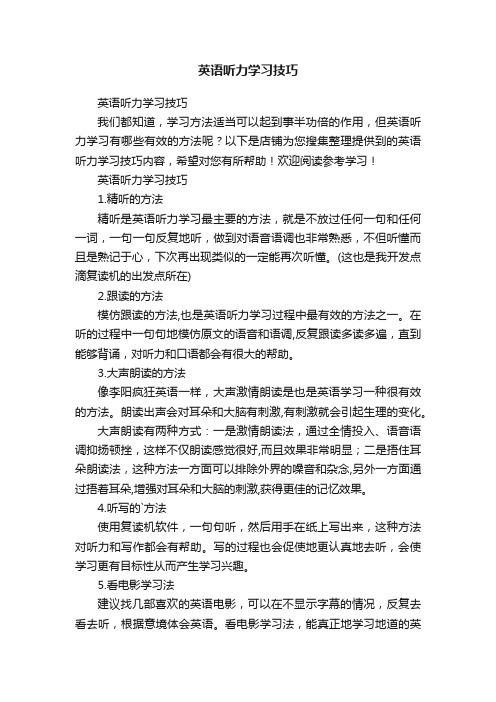
英语听力学习技巧英语听力学习技巧我们都知道,学习方法适当可以起到事半功倍的作用,但英语听力学习有哪些有效的方法呢?以下是店铺为您搜集整理提供到的英语听力学习技巧内容,希望对您有所帮助!欢迎阅读参考学习!英语听力学习技巧1.精听的方法精听是英语听力学习最主要的方法,就是不放过任何一句和任何一词,一句一句反复地听,做到对语音语调也非常熟悉,不但听懂而且是熟记于心,下次再出现类似的一定能再次听懂。
(这也是我开发点滴复读机的出发点所在)2.跟读的方法模仿跟读的方法,也是英语听力学习过程中最有效的方法之一。
在听的过程中一句句地模仿原文的语音和语调,反复跟读多读多遍,直到能够背诵,对听力和口语都会有很大的帮助。
3.大声朗读的方法像李阳疯狂英语一样,大声激情朗读是也是英语学习一种很有效的方法。
朗读出声会对耳朵和大脑有刺激,有刺激就会引起生理的变化。
大声朗读有两种方式:一是激情朗读法,通过全情投入、语音语调抑扬顿挫,这样不仅朗读感觉很好,而且效果非常明显;二是捂住耳朵朗读法,这种方法一方面可以排除外界的噪音和杂念,另外一方面通过捂着耳朵,增强对耳朵和大脑的刺激,获得更佳的记忆效果。
4.听写的`方法使用复读机软件,一句句听,然后用手在纸上写出来,这种方法对听力和写作都会有帮助。
写的过程也会促使地更认真地去听,会使学习更有目标性从而产生学习兴趣。
5.看电影学习法建议找几部喜欢的英语电影,可以在不显示字幕的情况,反复去看去听,根据意境体会英语。
看电影学习法,能真正地学习地道的英语听力和口语,也会更学习者带来更大的兴趣和挑战。
6.听歌学习法反复听和练唱英语歌曲,有目标,有兴趣地学习,也是一种很有效的英语听力口语学习方法。
相关内容英语听力口语考试技巧一般来说,口试的内容一般由"朗读短文、回答问题、情景对话和话题简述"4部分组成。
"朗读短文"要求学生能比较流利地朗读一篇所学课文或难度略低于所学语言材料的内容。
- 1、下载文档前请自行甄别文档内容的完整性,平台不提供额外的编辑、内容补充、找答案等附加服务。
- 2、"仅部分预览"的文档,不可在线预览部分如存在完整性等问题,可反馈申请退款(可完整预览的文档不适用该条件!)。
- 3、如文档侵犯您的权益,请联系客服反馈,我们会尽快为您处理(人工客服工作时间:9:00-18:30)。
Improving Listening SkillsListening TipsDoes this situation seem familiar to you? Your English is progressing well, the grammar is now familiar, the reading comprehension is no problem, you are communicating quite fluently, but:Listening is STILL a problem!First of all, remember that you are not alone. Listening comprehension is probably the most difficult task (noun=exercise, job) for almost all learners of English as a foreign language. So, now you know you are not alone....! OK. The most important thing is to listen, and that means as often as possible. The next step is to find listening resources. This is where the Internet really comes in handy (idiom = to be useful) as a tool for English students. Here are some suggestions for interesting listening selections:StrategiesOnce you have begun to listen on a regular basis, you might still be frustrated(adjective=upset) by limited understanding. What should you do?Here is some of the advice I give my students:∙Accept the fact that you are not going to understand everything.∙Keep cool (idiom=stay relaxed) when you do not understand - even if you continue to not understand fora long time.∙Do not translate into your native language (synonym=mother tongue)∙Listen for the gist (noun=general idea) of the conversation. Don't concentrate on detail until you have understood the main ideas.I remember the problems I had in understanding spoken German when I first went to Germany. In the beginning, when I didn't understand a word, I insisted on translating it in my mind. This approach (synonym=method) usually resulted in confusion. Then, after the first six months, I discovered two extremely important facts; Firstly, translating creates a barrier (noun=wall, separation) between the listener and the speaker. Secondly, most people repeat themselves constantly. By remaining calm (adjective=relaxed), I noticed that - even if I spaced out (idiom=to not pay attention) I could usually understand what the speaker had said. I had discovered some of the most important things about listening comprehension:Translating creates a barrier between yourself and the person who is speakingWhile you are listening to another person speaking a foreign language (English in this case), the temptation is to immediately translate into your native language. This temptation becomes much stronger when you hear a word you don't understand. This is only natural as we want to understand everything that is said. However, when you translate into your nativelanguage, you are taking the focus of your attention away from the speaker and concentrating on the translation process taking place in your brain. This would be fine if you could put the speaker on hold (phrasal verb=to make a person wait). In real life however, the person continues talking while you translate. This situation obviously leads to less -not more- understanding. I have discovered that translation leads to a kind of block (noun=no movement or activity ) in my brain which sometimes doesn't allow me to understand anything at all!Most people repeat themselvesThink for a moment about your friends, family and colleagues. When they speak in your native tongue, do they repeat themselves? I don't mean literally (adverb=word for word), I mean the general idea. If they are like most people I have met, they probably do. That means that whenever you listen to someone speaking, it is very likely (adjective=probable) that he/she will repeat the information, giving you a second, third or even fourth chance to understand what has been said.By remaining calm, allowing yourself to not understand, and not translating while listening, your brain is free to concentrate on the most important thing: Understanding English in English.Tips∙Listen to something you enjoyProbably the greatest advantage about using the Internet to improve your listening skills is that you can choose what you would like to listen to and how many and times you would like to listen to it. By listening to something you enjoy, you are also likely to know a lot more of the vocabulary required!∙Listen for KeywordsUse keywords (noun=principal words) or keyphrases to help you understand the general ideas. If you understand "New York", "business trip", "last year" you can assume (verb=to take for granted, suppose) that the person is speaking about a business trip to New York last year. This may seem obvious to you, but remember that understanding the main idea will help you to understand the detail as the person continues to speak.∙Listen for ContextLet's imagine that your English speaking friend says "...I bought this great tuner at JR's. It was really cheap and now I can finally listen to National Public Radio broadcasts." You don't understand what a tuner is. If you focus on the word tuner you might become frustrated. However, if you think in context (noun=the situation explained during the conversation) you probably will understand. For example; bought is the past of buy, listen is no problem and radio is obvious. Now you understand: He bought something - the tuner- to listen to the radio.A tuner must be a kind of radio! This is a simple example but it demonstrates what you need to focus on: Not the word that you don't understand, but the words you do understand.SummaryIt might seem to you that my ideas on how to listen encourage you to not understand everything. This is absolutely correct. One hundred percent understanding is something to work towards(phrasal verb=to have as a goal, a plan for the future) and not to expect of yourself now. Listening needs a great amount of practice and patience. Allow yourself the luxury of not becoming nervous when you do not understand, and you will be surprised by how quickly you do begin to understand.Listening often is the most important way to improve your listening skills. Enjoy the listening possibilities offered by the Internet and remember relax......。
